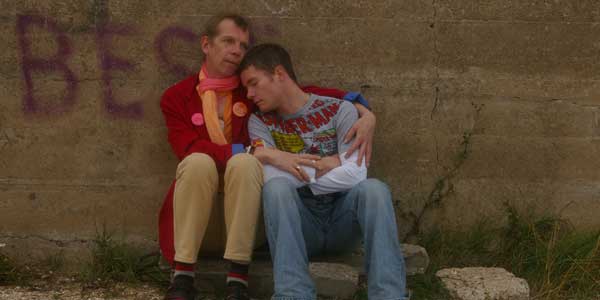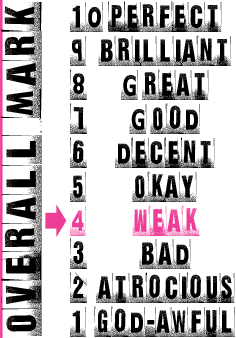
Director: David Hoyle, Mike Nicholls, Gary Reich
Running Time: 95 mins
Certificate: 18
Release Date: December 5th, 2011

It’s not often that a film can elicit two completely different reactions from me, but Uncle David managed it. If you asked for my knee-jerk feeling, I’d have to say I hated it. While watching it I found it slow, tedious, rather annoying and more than a little pretentious. Despite this, the movie has stuck in my head and kept me thinking about it for days afterwards.
The plot is relatively simple. David (David Hoyle) is a middle-aged man living with his young lover, Ashley (Ashley Greene), in a chalet in a remote, windy, British seaside town. While their life seems rather basic and deprived, David lives in a world of his own philosophical making, endlessly lecturing the receptive Ashley about his ideas on life, and how nearly everybody in the world is buying into what he believes is a corrupt and corrupting system.
As David continually indoctrinates the impressionable Ashley into his way of thinking, the relationship is revealed to be increasingly unhealthy. The middle-aged man and adolescent are actually blood relatives as well as lovers, and David’s philosophy may have a fatal end-game.
It took me a while to work out how I could dislike Uncle David so much while I was watching it, but for it to stick in my head so long afterwards. However, I think the reason is that a lot of thought has gone into the movie and that there’s evidence of a real artist’s mind at work, but this brute talent isn’t matched by an ability to create a fully realised film. With many independent movies, issues arise from a film’s budget not being able to match the ambition, but despite Uncle David obviously being made for very little money, it’s a lack of appreciation for film basics that seems to be the main issue here, rather than a lack of cash.
It’s often noted that film is a visual medium, but other than in a relatively basic sense, that doesn’t come through in Uncle David. The headiness of David’s philosophy is contrasted with the wildness of nature and the rather rundown shabbiness of the Isle Of Sheppey, but beyond that the film has a predisposition towards telling us things rather than showing us, which it rarely deviates from.
David’s long, rather rambling speeches to Ashley quickly become rather tedious. Writer/director/star David Hoyle is famed as a performance artist and well known for his retired ‘anti-drag queen’ act The Divine David. A legend on the cabaret circuit, during most of his career he’s been used to being able to hold people’s attention in intimate settings, with his examinations of bourgeois Britain and gay culture.
He tries to replicate that on film, but the fact film is a more open world means it’s tougher to keep an audience on side through long, rather dense speeches, especially without a good grasp of film grammar and style. It may have helped if the speeches felt more incisive, but while fitting for the character, they come across as a man in love with the sound of his own voice who has no interest in what anyone else thinks or in anything that doesn’t back up his nihilistic view of the modern world. The overall result is a character who is kind of interesting but who quickly becomes very tedious to watch.
I presume the intention was for the audience to initially agree with David’s anti-everything-about-the-modern-world views, but only later realise the dark end-point of his philosophy and feel challenged by that, but his speeches don’t feel either smart or forceful enough for that. In fact it might have helped the film a lot if there’d been a greater sense of what it is about David that pulls Ashley in so far.
It doesn’t help either that the younger lover is played by Ashley Greene, a man who’s had plenty of success on the gay porn scene, but who doesn’t really have much acting skill. Although Ashley’s role initially seems a pretty simple one – basically just listen to David and occasionally agree with him – as the movie progresses it becomes clear that what’s needed is an actor with a lot of skill and subtlety. On the surface, Uncle David seems like its success rests on the verbose talent of Hoyle, but it’s in Ashley’s character that the real potential power of the piece lies. Sadly Greene doesn’t have the skill to be anything more than a cipher for David, with the result that the film lacks an absolutely essential counterbalance.
The only part of the film that works while you’re actually watching it is the conclusion, which is slightly disturbing and pretty well handled, with a nicely creepy turn from Hoyle. Indeed, it was because the ending is actually pretty good that helped keep the film in my mind, with my brain then working its way backwards over what had gone before.
I eventually decided to rewatch the film to see if I’d got the first 75 minutes completely wrong on my first viewing, but a second chance just underlined to me that Uncle David isn’t a very well made film at all, despite the ending. David Hoyle himself has a lot to offer, but it’s difficult not to feel he needed a stronger guiding hand with this debut feature, to ensure that all the skills he’s developed on the stage could be brought successfully to the world of film. Despite having a couple of co-directors, that sense of knowing how to fully communicate through film isn’t there in Uncle David, even if there’s evidence of worthwhile thought behind the movie.
Hopefully this will be Hoyle’s dry run for something far more successful next time around. With the help of people who really, truly know their way around film, I believe he could produce something extraordinary. Sadly though, while there’s hints at that leaking through in Uncle David (particularly in retrospect), it doesn’t work. Sometimes a movie can be a tough, frustrating watch but it’s worth sticking through. I wish I could say Uncle David was one of those, but there’s not really enough reward to make the annoyance of watching it worthwhile.
Overall Verdict: An incredibly frustrating movie that feels like there’s a lot of talent trapped by a lack of knowledge of how to get that across in filmic form.
Reviewer: Tim Isaac





Leave a Reply (if comment does not appear immediately, it may have been held for moderation)